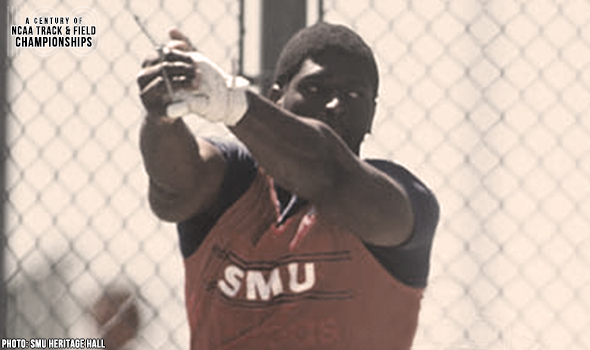
Weir Wouldn’t Be Denied In Throwing Events
It took a sometimes-frustrating three years, but Robert Weir finally beat fellow SMU teammate Richard Olsen in the hammer throw.
Weir thought he had it in the second year of their rivalry at the 1982 NCAA Division I Outdoor Track & Field Championships in Provo, Utah.
That’s when Weir led the competition until the last round at 73.24m (240-3). But Olsen, the defending champion, came back from a 7-foot deficit with a final effort of 73.30m (240-6) to snatch the victory. Weir’s only consolation from a second-straight NCAA runner-up finish to his teammate was leaving with the meet record, having tossed 73.34m (240-7) in the qualifying round.
“I knew from past experience that Richard will always be there. And he was,” Weir said.
That was the last time Weir lost to Olsen, who then owned a career 10-0 head-to-head edge in the hammer.
The pendulum swung in Weir’s favor in 1983, and the Englishman threw first notice with a world best in the weight throw of 23.64m (77-6¾) in early January before winning a second NCAA Indoor title in March. In April, he notched his first hammer win over Olsen and took Olsen’s collegiate record away at 74.06m (243-0).
At the 1983 NCAA DI Outdoor Championships in Houston, no one could touch Weir. After a first-round foul he took the lead at 72.60m (238-2) – a mark that would end up being long enough to win but would be his shortest effort of the day.
In Round 4, Weir broke his own meet record with a 73.86m (242-4) heave, then followed up by improving his CR to 74.42m (244-2) to win by more than 11 feet. Olsen ended up third behind Declan Hegarty of Boston University.
Interestingly, Weir’s CR wasn’t a PR. The previous fall he had won the Commonwealth Games with an “all-dates” collegiate best of 75.08m (246-4).
Weir’s postseason success also repeated in 1983 as he extended his world best in the weight throw to 24.14m (79-2½) in September, even though his specific training for the event had ended in March.
The NCAA and collegiate track & field will mark a momentous milestone in the spring of 2021 -- the 100th anniversary of the NCAA Championships and with that, the NCAA Track & Field Championships. In June 1921, the University of Chicago hosted the first track & field championships in NCAA history.
This point can’t be emphasized enough: Not only was the event the first for NCAA track & field, but the first championships for any sport under the sponsorship of the NCAA.
To celebrate, over each of the next 365 days, the U.S. Track & Field and Cross Country Coaches Association (USTFCCCA) will celebrate moments, student-athletes, and coaches that have made a century’s worth of championships special. From humble beginnings to important historical milestones to the modern-day, collegiate track & field has evolved with the American society.
The 2021 edition of the NCAA Division I Outdoor Track & Field Championships begin with preliminary round action on May 27-29 in Jacksonville, Fla., and College Station, Texas. The championships final site and culmination of the celebration is slated for June 9-12, 2021 at the newly rebuilt Hayward Field in Eugene, Ore.

ON THIS DAY: Kerley Set 400-Meter CR In Austin
Fred Kerley set a collegiate record in the 400 on this day in 2017. Kerley went 43.70 at the NCAA DI West Preliminary Round in Austin, Texas.

Reese Left Her Mark On NCAA LJ
Brittney Reese won the long jump at the 2008 NCAA DI Outdoor T&F Championships with a mark of 6.93m (22-9). Reese missed the meet record by just 1cm (½ inch).

Foster Won All-Time Classic 110H In 1978
Greg Foster won an epic 110H race at the 1978 NCAA DI Outdoor T&F Championships. Foster beat Renaldo Nehemiah & set an AR, CR & MR in the process with his 13.22.

D’Agostino Won By Slim Margin In 2012
Abbey D’Agostino won back-to-back 5K titles at the NCAA DI Outdoor T&F Championships in 2012 & 2013. When D’Agostino won in 2012, it was by just 0.03 seconds.

Tupuritis Shocked The Field In 1996
Einars Tupuritis won the 800 at the 1996 NCAA DI Outdoor T&F Championships by 0.14 seconds! Turpiritis crossed the finish line in 1:45.08.

Arkansas’ Brown Notched All-Time 100H Mark
Janeek Brown won the 100H at the 2019 NCAA DI Outdoor T&F Championships in 12.40, narrowly missing the collegiate record and meet record.

Brown Paced Tennessee To 1974 Team Title
Doug Brown won back-to-back steeplechase titles at the NCAA DI Outdoor T&F Championships in 1973 & 1974. His victory in 1973 was by 17.2 seconds!

EMU’s Jones Hurdled Into NCAA History
Hayes Jones completed the 120H-220H sweep at the 1959 NCAA Outdoor T&F Championships. Jones won the last 220H title ever awarded at the meet.

Ellis Sent USC To A Thrilling Victory
Kendall Ellis had a remarkable come-from-behind victory in the 4×400 relay at the 2018 NCAA DI Outdoor T&F Championships that sent Southern California to the meet title.

Paige Turned Three NCAA Mid-Distance Titles
Don Paige won three career titles at the NCAA DI Outdoor T&F Championships, including a 800-1500 sweep in 1979.

